Academy of American Poets Fifth Annual Chancellor's Reading
On Thursday, October 26, I attended my first Chancellor's Reading of the Academy of American Poets. I'm always a sucker for events featuring multiple poets, so this was quite a treat. Jill, Friend of BillyBlog, joined me for the event which was held at the Kaye Playhouse at Hunter College at East 68th Street in Manhattan.
Tree Swenson provided a brief introduction. She advised that Philip Levine had to cancel at the last minute, and that we were going in reverse alphabetical order. Then, the following poets/chancellors took the stage: Rita Dove, Frank Bidart, Gerald Stern, Kay Ryan, Galway Kinnell, Nathaniel Mackey and Ellen Bryant Voigt.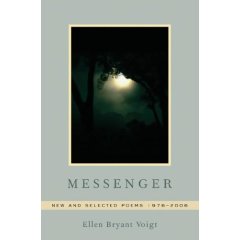
 The reading started with Ellen Bryant Voigt. I'm not a huge fan of hers and her reading was not very memorable. She read several sections from a long poem, the title poem "Messenger," from her upcoming collection of poems, due out from Norton in January 2007.
The reading started with Ellen Bryant Voigt. I'm not a huge fan of hers and her reading was not very memorable. She read several sections from a long poem, the title poem "Messenger," from her upcoming collection of poems, due out from Norton in January 2007.
Perhaps it was the woman in front of me, thickening the air with Calvin Klein Obsession or the muttering poet/professor who sat behind me prior to the reading talking about how great he was, but I was distracted to the point that Ms. Voigt's reading fell flat for me. Perhaps I just don't have the werewithal to tune into longer poems at a reading. Who knows? Moving on . . .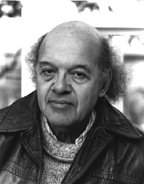 Next up was Gerald Stern, who I have had the pleasure of hearing read numerous times. He graced us first with a poem by Philip Levine. He read "My Given Name" from Levine's last collection Breath.
Next up was Gerald Stern, who I have had the pleasure of hearing read numerous times. He graced us first with a poem by Philip Levine. He read "My Given Name" from Levine's last collection Breath.
Then he read four poems, "two short, two a little longer." The first was called "Shouldering" from his collection Everything is Burning. Next was "You Know I Know," a poem he had written about talking to a Korean War veteran in Washington D.C., while waiting to change trains "from one form of fuel to a more stupid form of fuel." He ended with a funny little poem about a chihuahua called "Save the Last Dance for Me."
Stern was followed by Kay Ryan, a poet I had only recently become familiar with. I had heard her read a bit from a podcast (mp3 here) in which she is dicussing poetry with Billy Collins and Garrison Keillor. She started with a piece called "Home to Roost":
Home to Roost
The chickens
Are circling and
Blotting out the
Day. The sun is
bright, but the
chickens are in
the way. Yes,
the sky is dark
with chickens,
dense with them.
They turn and
then they turn
again. These
are the chickens
you let loose
one at a time
and small-
various breeds.
Now they have
Come home
To roost -all
The same kind
At the same speed.
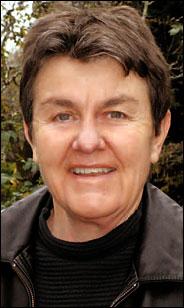 Her next poem was based on a brief vision she had had, in which everyone was carrying a ladder. It was called "A Visionary Poem." Jill remarked after the reading that she didn't initially like Ms. Ryan's poems, but they grew on her. I would concur. She uses internal rhyming and assonance to a high degree of perfection. It is quite moving, and pleasing to listen to her read.
Her next poem was based on a brief vision she had had, in which everyone was carrying a ladder. It was called "A Visionary Poem." Jill remarked after the reading that she didn't initially like Ms. Ryan's poems, but they grew on her. I would concur. She uses internal rhyming and assonance to a high degree of perfection. It is quite moving, and pleasing to listen to her read.She then read a poem called "Tired Blood," which was in her last book The Niagara River: Poems. In the New York Times, last December, David Kirby reviewed the book and, referring to "Tired Blood," stated "often her images are deliberately unlovely: silences are embedded in a noisy city like shark's teeth, a tired person's blood is cruddy with tiny metal office furniture." She paused after one line, mid-poem, and glowed: "It gave me great satisfaction to say painful cabinets."
She then read the title poem to The Niagara River, then talked about malapropisms (like "Leap before you look") and their role in the next poem, "Green Behind the Ears". She followed with "Atlas," which David Yezzi discussed in The Weekly Standard:
Her poem "Shipwreck" began with an epigraph that is well worth repeating here:Occasionally, Ryan's serendipitous rhymes and tightly turned ruminations approach a kind of light verse, sporting an against-the-grain delight in wit and a rare confidence that humor needn't cancel the truth in a poem. "Atlas," for example, tickles the reader while shrewdly identifying a palpable human experience:
Extreme exertion isolates a person from help, discovered Atlas. Once a certain shoulder-to-burden ratio collapses, there is so little others can do: they can't lend a hand with Brazil and not stand on Peru.
I was shipwrecked beneath a stormless skyThink about that for a minute. Such an evocative image. You can read Ryan's poem here. If you've been looking, you'll notice her poems are short and concise, which is why we received so many at the reading. She ended with "Weak Forces".
in a sea shallow enough to stand up in.
— Fernando Pessoa
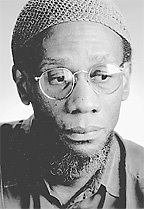 Next up was Nathaniel Mackey. Like Ryan, this was the first time I had heard him read. He read sections from an ongoing series of poems called "Song of the Andoumboulou". Poems #21 and #50 (not necessarily the ones he read) can be accessed by clicking the link above. Unfortunately, the length of the reading did not support a better appreciation of this work. However, there was some great imagery within his work.
Next up was Nathaniel Mackey. Like Ryan, this was the first time I had heard him read. He read sections from an ongoing series of poems called "Song of the Andoumboulou". Poems #21 and #50 (not necessarily the ones he read) can be accessed by clicking the link above. Unfortunately, the length of the reading did not support a better appreciation of this work. However, there was some great imagery within his work.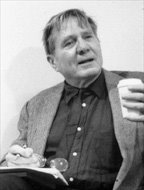
Next up was Galway Kinnell, who is always a pleasure to hear. He started with "Middle Path: In Memory of James Wright 1927-1980," which referred to the Middle Path walkway that separated the quad at Kenyon College where James Wright taught. He then read "The Dinner Party," reprinted in full here. Kinnell described this as a narrative with a divided speaker. on one hand he is looking for pleasure, on the other hand he is feeling obliged to go to work.
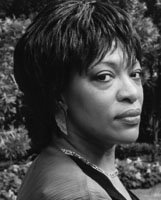
Kinnell was followed by former U.S. Poet Laureate Rita Dove. She read a series of several poems that deal with visual artists, "each positioned at a moment of historic flux in different cities." Portions of what she read appear here, under the title "Brightening" in The Virginia Quarterly Review. She presented the following part under the title "Paris":
She followed with a poem for Elisabeth Schwartzkopf, the famous German opera singer, and ended with a marvelous poem called "Reunion 2005". I wish I could find it online. Alas, all I scribbled down was the line "My Cleveland cousins/have everyone speaking/Southern."
I want only the paint:
swirled ridges, crusts of pigment
curling off the lip of the knife.
I want my life to be
the story of paint, concrete color:
a flying fish so orange, it's a medallion
cast into ashes. Now I will stop biting
my cuticles and my back will stop aching
so I can paint until the sun comes up;
then I'll take a cup of sherry to bed
to calm down. I want to lick the canvas,
grow buoyant on turpentine, make love
to every year between eighteen and twenty-five
and paint each in its own color—
reddening branch, emerald caduceus of leaves
traveling fast over the garden wall.
I want the cerise of the poisoned berry
and the blue eel and the gray of the pebble
you must moisten with your tongue
to bring out its platinum sheen.
I want you to be that pebble.
I want to put you in my mouth.
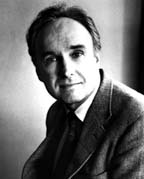 The reading concluded with Frank Bidart. He started with a poem called "To the Republic," which he had read last year at the same event, only he added three more lines. According to a site called Republic Blog News, he read the same poem earlier this month at Wesleyan and
The reading concluded with Frank Bidart. He started with a poem called "To the Republic," which he had read last year at the same event, only he added three more lines. According to a site called Republic Blog News, he read the same poem earlier this month at Wesleyan andThe poem is reprinted here on a blog called Just Between Strangers.The audience responded particularly well to "The Republic," a poem inspired by a bad dream. In the poem, Bidart describes the bodies of exhumed Gettysburg soldiers. The poem had powerful political connotations.
"It is about the idea that this government is ruining what the United States stood for in the world," Bidart said. "If it's any good, it will not just be an anti-Bush poem, but be about the past coming and saying that you've betrayed the legacy we left here."
Next was "Poem Ending with Three Lines from 'Home on the Range' ". You can read it here in Slate. You can also hear Bidart read it here. He ended with a sestina entitled "If See No End in Is," which Bidart said was his "first sestina and, I assure you, my last."
I know, I know. This was long. (I'm not done yet). But after reading on another person's blog that my recap of the Best American Poetry launch was "pedestrian," I feel I have a reputation to maintain.
After the reading, I went to work getting books signed. Gerald Stern and Galway Kinnell sat at a table. Rita Dove was behind them standing by a window ledge. Frank Bidart, Nathaniel Mackey and Kay Ryan were mingling. Ellen Bryan Voigt disappeared early.

Ms. Dove graciously signed under her photograph in a book called Angels, Anarchists & Gods. She also signed her contributions in The Best American Poetry (BAP) volumes for 2003 and 2004.
Nathaniel Mackey elaborately signed his pages in BAP '88, '90, '02 and '04.
When Kay Ryan saw me standing next to her holding my copies of BAP '95, the Best of the BAP 1988-1997, BAP '99, and First Loves: Poets Introduce the Essential Poems That Captivated and Inspired Them, she looked at me and said, "Oh, you're one of those." I looked at her and asked is that a "good" "one of those" or a "bad" "one of those," she said good and warmed up when she realized I was a collector and not a dealer. She signed what I had.
Frank Bidart signed his page in Robert Pinsky's The Handbook of Heartbreak: 101 Poems of Lost Love and Sorrow and inscribed a hardcover copy of his first book Golden State. We talked briefly about how great New York City was for readings and how it blew Southern California out of the water. He had grown up in Bakersfield and spent many years at UC Riverside, so we chatted briefly about Pasadena and my alma mater, Occidental College.
I then went back and caught Galway Kinnell before as he was leaving. He signed his page in BAP '05 and then I had an unusal request. I already had an inscribed copy of C.K. Williams' The Singing. After asking nicely, and showing that Mr. Williams had already inscribed it to me on the title page, Mr. Kinnell inscribed the dedication page, as he was the dedicatee. This made my copy a little more unusual and that much more pleasurable to me.
I missed Gerald Stern and Ellen Bryant Voigt completely. Oh well.
Thanks for enduring this post. Comments are appreciated.

1 comment:
Post a Comment